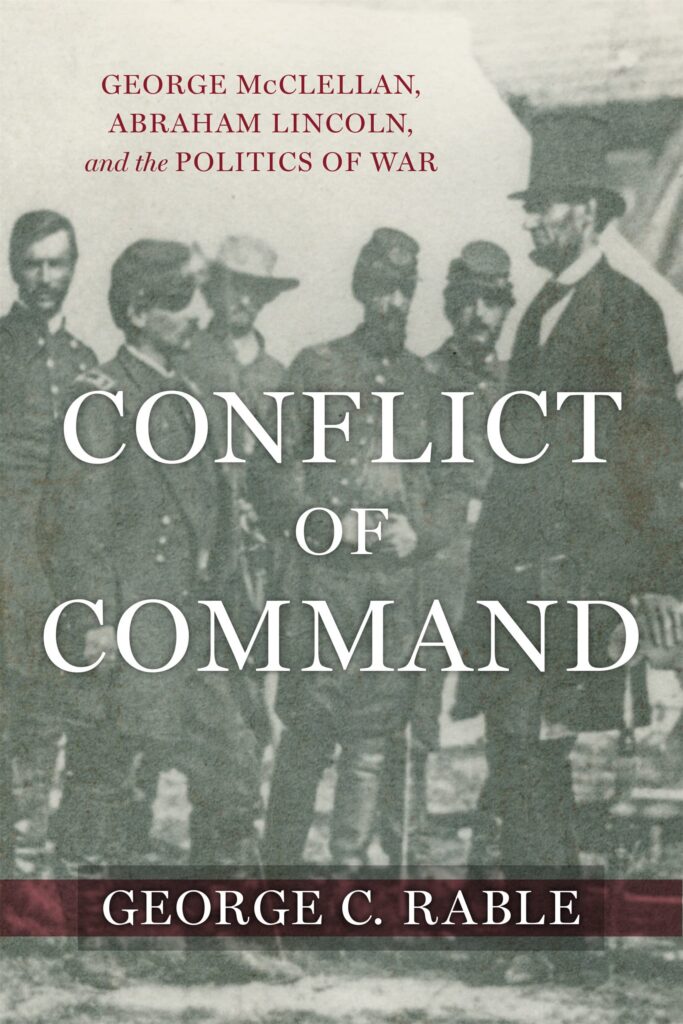By George C. Rable.
Baton Rouge: Louisiana State University Press, 2023.
ISBN 978-0-8071-7977-2. Photographs. Maps. Notes. Bibliography. Index.
Pp. xii, 476. $49.95.
George C. Rable has produced another excellent addition for the library of students of the Civil War era. The relationship between President Abraham Lincoln and Major General George B. McClellan is one of the most significant topics of the Civil War. Although covered by many before him, Rable presents thought-provoking arguments seldom explored by others.
Countless historians present McClellan and Lincoln’s relationship in the context of the war, relying on the commonly accepted interpretation of events established early in the war and solidified in its immediate aftermath. Rable provides analysis, mining sources frequently overlooked or underutilized, often questioning previous, widely accepted conclusions. As Rable states in his introduction, the historical record of McClellan is settled, and there is no appetite for revisiting the record. In the few instances where historians challenged widely accepted conclusions, they met significant criticism for their efforts. Despite this, Rable dives into the deep end of this pool. His research runs through a long list of papers, letter collections, articles, and books.
During McClellan’s active service, he had both supporters and detractors, generally divided by Democrats (pro-McClellan) and Republicans (anti-McClellan). The main controversy was whether the war would end with an intact Union without slavery or an established Confederacy with slavery. Regardless of one’s position on the great questions of the Civil War, McClellan was generally respected. Even after Lincoln finally dismissed McClellan from command and Lincoln’s 1864 reelection, in which he defeated McClellan, there were still those supporting McClellan’s restoration to command. However, Lincoln’s assassination shifted McClellan’s reputation negatively. After the war, while the dead Lincoln’s popularity was strong and gaining strength, McClellan’s reputation suffered and never recovered. McClellan was unable to personally present his case due to a fire that destroyed his papers and his own unexpected death, leaving his reputation to the insufficient efforts of others. We are at a point where everyone seems to have accepted the standard picture of McClellan rather than attempting an independent analysis. Rable is breaking that mold to the reader’s benefit.
Rable’s unique approach, for example, stands out in his treatment of the often-repeated story of how McClellan snubbed Lincoln, leaving the President waiting in his front parlor while McClellan slept. According to most historians, Lincoln, accompanied by Secretary of State William H. Seward and Lincoln’s secretary John Hay, visited McClellan’s residence while the general was out. They waited in McClellan’s parlor for the general to return. When McClellan did return home, he went directly to his sleeping quarters. After he did not return for quite some time, a servant was sent to remind McClellan that Lincoln was waiting. The servant returned to inform Lincoln that McClellan had turned in for the evening. This incident has been presented as perhaps the worst case of insolence ever perpetrated by a general towards a President. The problem with the story is that the only contemporary reporting of the incident comes from the diary of Hay, who harbored deep-seated animosity toward McClellan. This has become the damning story against McClellan, evidence of his enormous ego and disdain of authority. The revelation of Hay’s involvement raises the question of whether the incident ever happened and casts doubt upon all the historians who repeated it through the years. Perhaps a fuller analysis of this incident is in order. Until then, it is up to the reader to consider.
The book is not just about McClellan. It is about both McClellan and Lincoln, their relationship, and the politics of the war. Regarding the President, Rable explores Lincoln’s growth as a wartime leader, facing the demands of the war while balancing the many, often difficult, personalities, in and out of government, he needed to get the job done successfully. A strength of Lincoln was his ability to reach that balance while keeping the goal of maintaining the Union. This skill, unappreciated by most modern Americans, helped shape our nation as it exists today.
Readers will come to their own conclusions regarding Lincoln, McClellan, and the politics of the Civil War. This reviewer’s conclusion is that among the major personalities on the Union side, no one is all one thing or the other. Each had strengths and weaknesses, and each grew as the war progressed. If this interests others, they should put Conflict of Command on their reading list.
Command Sergeant Major James H. Clifford, USA-Ret.
McDonough, Georgia
